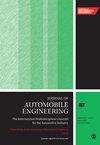Lane-changing policy offline reinforcement learning of autonomous vehicles based on BEAR algorithm with support set constraints
IF 1.5
4区 工程技术
Q3 ENGINEERING, MECHANICAL
Proceedings of the Institution of Mechanical Engineers Part D-Journal of Automobile Engineering
Pub Date : 2024-08-03
DOI:10.1177/09544070241265752
引用次数: 0
Abstract
Imitation learning struggles to learn an optimal policy from datasets containing both expert and non-expert samples due to its inability to discern the quality differences between these samples. Furthermore, standard online reinforcement learning (RL) methodologies face significant exploration costs and safety risks during environmental interactions. Addressing these challenges, this study develops a lane-changing model for autonomous vehicles using the bootstrapping error accumulation reduction (BEAR) algorithm. The model initially examines the distributional shifts between behavioral and target policies in offline RL. It then incorporates the BEAR algorithm, enhanced with support set constraints, to mitigate this issue. The study subsequently proposes a lane-changing policy learning method based on the BEAR algorithm in offline RL. This method involves designing the state space, action set, and reward function. The reward function is tailored to guide the autonomous vehicle in executing lane changes while balancing safety, ride comfort, and traffic efficiency. In the final stage, the lane-changing policy is learned using a dataset of both expert and non-expert samples. Test results indicate that the lane-changing policy developed through this method shows higher success rates and safety levels compared to policies derived via imitation learning.基于支持集约束 BEAR 算法的自动驾驶汽车变道策略离线强化学习
由于模仿学习无法辨别专家样本和非专家样本之间的质量差异,因此很难从包含专家样本和非专家样本的数据集中学习到最优策略。此外,标准的在线强化学习(RL)方法在环境交互过程中面临巨大的探索成本和安全风险。为了应对这些挑战,本研究使用引导误差累积减少(BEAR)算法为自动驾驶汽车开发了一个变道模型。该模型首先研究了离线 RL 中行为策略和目标策略之间的分布变化。然后,该模型采用 BEAR 算法,并通过支持集约束进行增强,以缓解这一问题。研究随后提出了一种基于离线 RL 中 BEAR 算法的变道策略学习方法。该方法包括设计状态空间、行动集和奖励函数。奖励函数是为引导自动驾驶车辆执行变道而定制的,同时兼顾安全性、乘坐舒适性和交通效率。在最后阶段,使用专家和非专家样本数据集学习变道策略。测试结果表明,与通过模仿学习获得的政策相比,通过这种方法制定的变道政策显示出更高的成功率和安全水平。
本文章由计算机程序翻译,如有差异,请以英文原文为准。
求助全文
约1分钟内获得全文
求助全文
来源期刊

CiteScore
4.40
自引率
17.60%
发文量
263
审稿时长
3.5 months
期刊介绍:
The Journal of Automobile Engineering is an established, high quality multi-disciplinary journal which publishes the very best peer-reviewed science and engineering in the field.
 求助内容:
求助内容: 应助结果提醒方式:
应助结果提醒方式:


